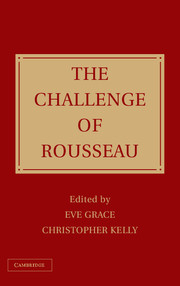
- Publisher:
- Cambridge University Press
- Online publication date:
- January 2013
- Print publication year:
- 2012
- Online ISBN:
- 9781139087575

Written by prominent scholars of Jean-Jacques Rousseau's philosophy, this collection celebrates the 300th anniversary of Rousseau's birth and the 250th anniversary of the publication of Emile. The depth and systematic character of Rousseau's thought was recognized almost immediately by thinkers such as Kant and Hegel, yet debate continues over the degree to which Rousseau's legacy is the result of poetic, literary or rhetorical genius, rather than of philosophic rigor or profundity. The authors focus on Rousseau's genuine yet undervalued stature as a philosopher. This collection includes essays that develop some of the complex problems Rousseau treated so radically and profoundly, as well as essays on the vigorous debates he engaged in with thoughtful contemporaries and predecessors.
“Eve Grace and Christopher Kelly have assembled a fine collection of essays of exceptionally high quality. They more than meet ‘the challenge’ of showing that there is coherence, consistency, and rigor as well as creativity in Rousseau’s thought. The scholarship is exemplary, combining careful study of the original texts, clear argumentation, and critical engagement with existing commentaries.”
– Catherine Zuckert, Notre Dame
“This volume brings together in a well-orchestrated collection important new interpretations by the most dynamic contemporary Rousseau scholars, senior and junior, continental and American.”
– Thomas L. Pangle, The University of Texas at Austin
“These excellent essays are an irresistible invitation to engage Rousseau’s thought in all of its depth and complexity.”
– Ruth Grant, Duke University
“Marking the tricentennial of Rousseau’s birth, this collection of essays is strikingly fresh and new. Bringing together major scholars to reexamine the central themes of Rousseau’s complex system, the volume sheds important new light on almost every subject it touches. While the authors have their differences, all agree on the need to treat Rousseau with the greatest philosophical seriousness. A first-rate collection.”
– Arthur Melzer, Michigan State University
“The Challenge of Rousseau promises to demonstrate Rousseau’s status as a thinker of the first rank, and it amply delivers. Editors Eve Grace and Christopher Kelly have assembled a diverse and impressive collection of essays, written by some of the most important scholars working on Rousseau in both the United States and France. The Challenge of Rousseau makes the case for Rousseau’s status as a thinker of the first rank by exploring Rousseau’s engagement with his philosophical predecessors; by directing new attention to Rousseau’s contributions in theology, epistemology, and the natural sciences; and by opening fresh perspectives on Rousseau’s political writings. Every essay contains some valuable insight; all are lucidly argued and feature meticulous attention to the texts of Rousseau and his philosophical interlocutors. This collection will be an invaluable resource to anyone seeking a full appreciation of Rousseau’s considerable intellectual achievements or a concise introduction to the best of the secondary literature.”
– Joseph R. Reisert, Colby College
 Loading metrics...
Loading metrics...
* Views captured on Cambridge Core between #date#. This data will be updated every 24 hours.
Usage data cannot currently be displayed.